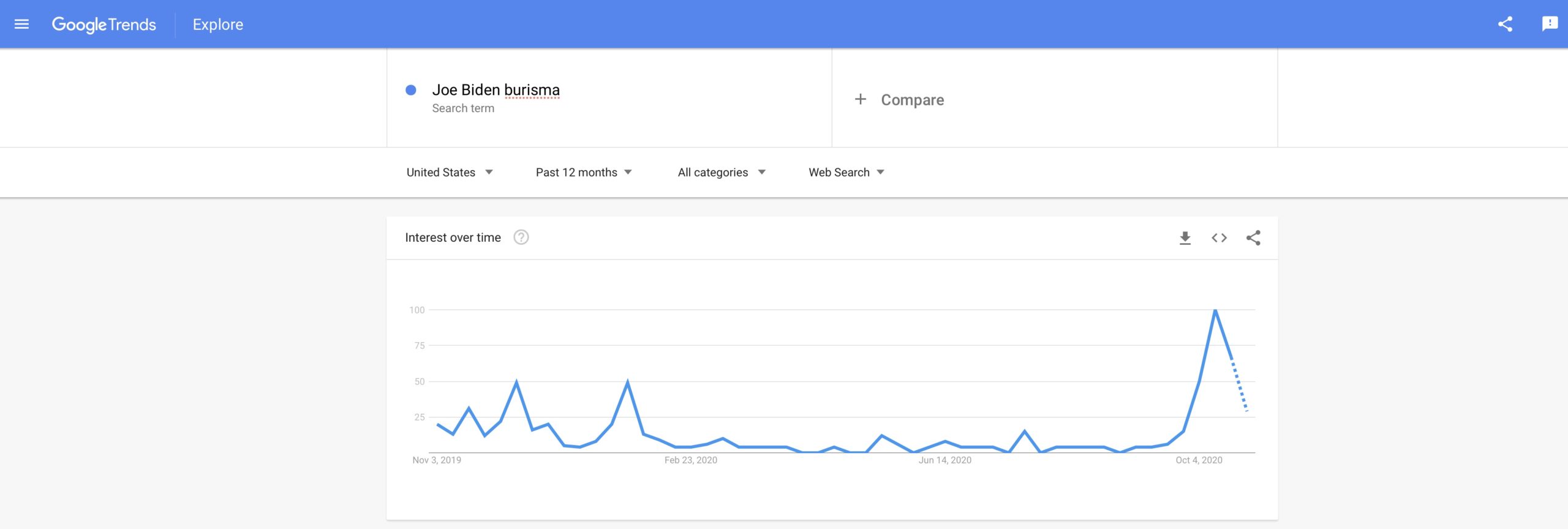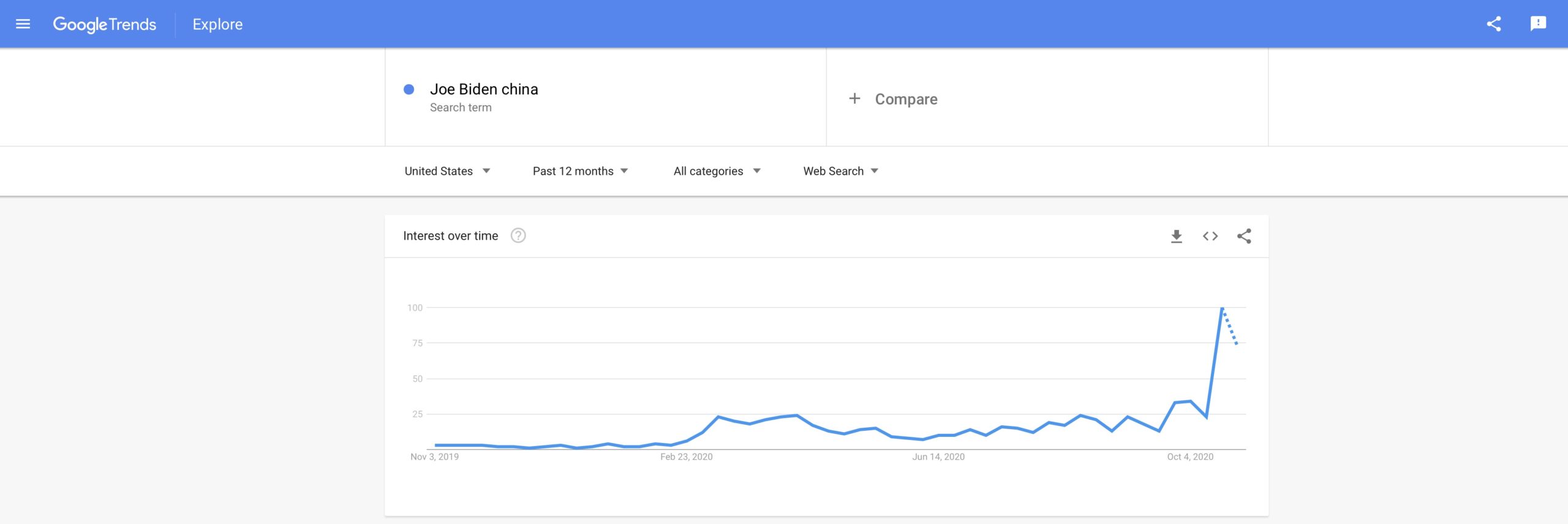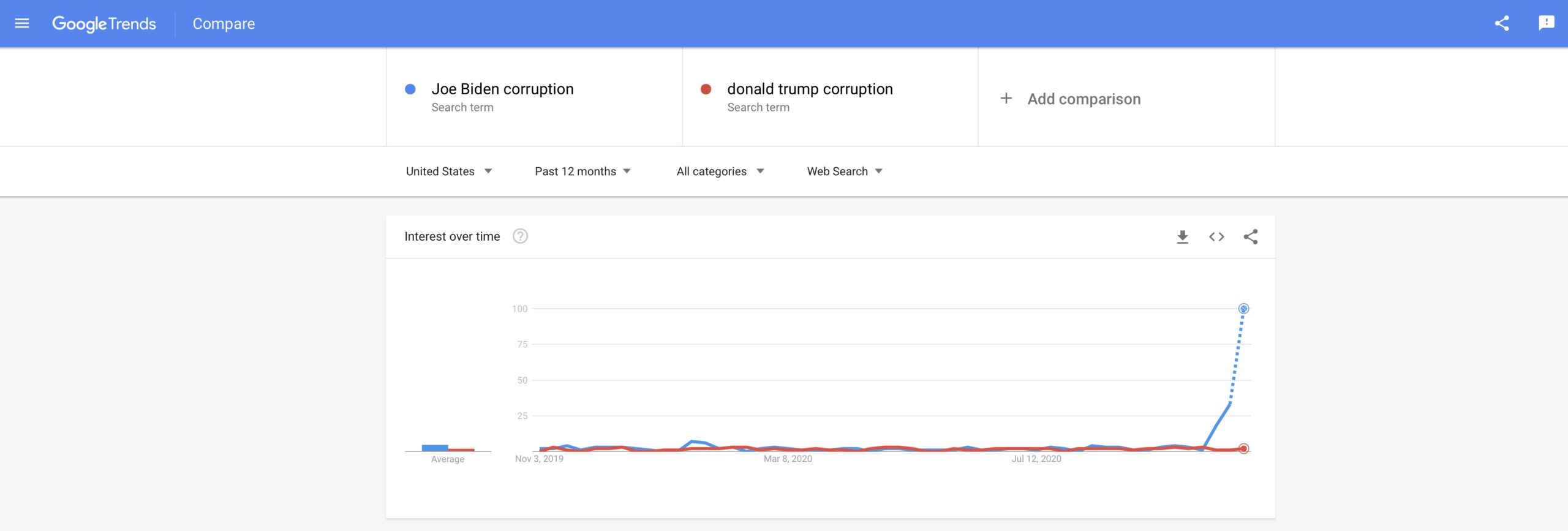'Joe Biden Corruption' Trends on Google Just Days Before the Election
Before Twitter locked the New York Post out of its account for a story regarding alleged emails from Hunter Biden’s computers, perhaps the company should have had a talk with Barbra Streisand.
It didn’t — and now, partially thanks to Twitter’s censorship, Google searches for “Joe Biden corruption” are exploding.
Some of you might know what I’m talking about. If you don’t, the singer and actress has lent her name to many things, almost all of which I don’t find interesting. An exception is the “Streisand effect.”
In 2003, according to Mental Floss, Streisand sued photographer Kenneth Adelman for $50 million because he published an aerial picture of her Malibu house online. Adelman wasn’t trying to invade Streisand’s privacy; his California Coastal Records Project was supposed to help scientists track beach erosion and contained over 12,000 pictures of the state’s coastline.
Before the lawsuit, the picture had been viewed six times; if you took away the two times Streisand’s lawyers viewed it, that made four times. After the lawsuit, it received millions of views. Ergo, the “Streisand effect” — an axiom of the internet age that if you try to suppress any piece of information, you’ll merely end up drawing more attention to it.
If you’ve even a passing interest in the curious business relationships Hunter Biden and what his father knew about them, you’re probably familiar with the saga of Twitter and the New York Post. Earlier this month, the paper published emails said to be from the hard drives of computers Hunter took in for repair and never claimed.
In one, an official from Burisma Holdings — a Ukrainian energy company which had Hunter Biden on its board despite the fact he’s known neither for his expertise in the energy field nor his experience in the corporate or political atmosphere of Eastern Europe — appeared to thank Hunter for introducing him to then-Vice President Biden.
In another, a possible deal with what was then China’s largest private energy firm was discussed along with talk about “remuneration” for Hunter Biden and others. The email included the cryptic phrase “10 held by H for the big guy?” A former business associate of Hunter Biden’s, Tony Bobulinski, later said “the big guy” in the email was Joe Biden.
Joe Biden’s campaign has never formally denied the emails were Hunter Biden’s; it merely claimed the whole thing is a disinformation campaign. The campaign did deny Biden officially met with the Burisma official, although it effectively conceded to Politico some kind of short encounter between the two may have taken place.
Biden said last year that he has “never spoken to my son about his overseas business dealings” and that remains the official line, even though the Post pieces seem to contradict that.
Twitter claimed the piece potentially contained hacked information — despite no evidence the data obtained from the hard drives was hacked in any way — and screen shots which showed the email addresses of the individuals involved. Thus, the company briefly embargoed users from sharing it, and also locked the New York Post out of its account.
While the social media giant eventually changed how it enforces its “Hack Materials” policy, it still said that the New York Post had to delete the story to restart posting. The Post could then tweet the story again, since it now met Twitter’s standards.
Essentially, what Twitter wanted the New York Post to do was admit it had done something wrong. The Post wasn’t willing to kowtow and the stalemate lingered for two weeks.
How did that end up for Twitter? While Google searches don’t necessarily correlate to information suppression, they also give us an idea of whether it’s working or not. What transpired in the days and weeks since the Post started reporting on Hunter Biden’s emails makes a good case for this being an example of the Streisand effect.
Here’s a Google Trends snapshot of searches for “Joe Biden corruption”:

There wasn’t really a bump until the week of Oct. 11-17. Oct. 14 is when the New York Post published the first story featuring the emails. Twitter locked the Post out shortly afterward.
While searches for “Joe Biden Burisma” have had more peaks over the past year, Oct. 11-17 saw, by far, the highest number of people searching the term:

Meanwhile, here were searches for “Joe Biden China,” which appears to have gained popularity right as Tony Bobulinski entered our cultural discourse:

For comparison, meanwhile, here’s “Joe Biden corruption” against “Donald Trump corruption”:

Keep in mind, these are the final days of a nearly two-year campaign during which our collective American neurons have been sandblasted with the message that President Trump is fundamentally corrupt and that, when he isn’t flouting norms and engaging in dictatorial thuggery, he’s using the office to enrich himself and his family.
What’s remarkable, then, is whose alleged corruption we’re searching up information about.
After a two-week battle, Twitter relented and let the New York Post back into its Twitter account:
We’re baaaaaaack https://t.co/D39qdLGMdV pic.twitter.com/SkVtp4o9ew
— New York Post (@nypost) October 30, 2020
And while the Post was gone, Barbra Streisand’s eponymous axiom was doing its thing:
The Post’s Twitter account gained nearly 190,000 followers during blackout https://t.co/ccBJHbYI6i pic.twitter.com/VgWXSuRH1T
— New York Post (@nypost) October 30, 2020
No matter the winner or the effect the Post’s stories had on voters’ perceptions of Joe Biden, those who look at the media will long question what effect Twitter’s censorship, lockouts, reversals and jesuitical explications of its policies had in amplifying that narrative.
Whether or not Twitter believed its public explanations on the matter or wanted to act as a counterweight to a story that raised red flags for them — either because of inherent organizational biases or fear of platforming disinformation — its strategy clearly didn’t work. This will be, whether social media likes it or not, part of the narrative until Election Day — and that’s going to be trouble for Joe Biden.
Twitter can be cheered, at least, that many of the more prolific tweeters in the platform’s liberal bubble are willing to focus on the alleged perfidies of Donald Trump and his children:
Joe Biden clearly won the debate and he refrained from attacking the Trump children who have all benefited financially including money from foreign governments.
— Barbra Streisand (@BarbraStreisand) October 23, 2020
Perhaps Twitter would be wise not to listen to her on all matters, but in terms of what happens when you very publicly try to suppress information, she could have been a handy guide.
Truth and Accuracy
We are committed to truth and accuracy in all of our journalism. Read our editorial standards.
Advertise with The Western Journal and reach millions of highly engaged readers, while supporting our work. Advertise Today.











